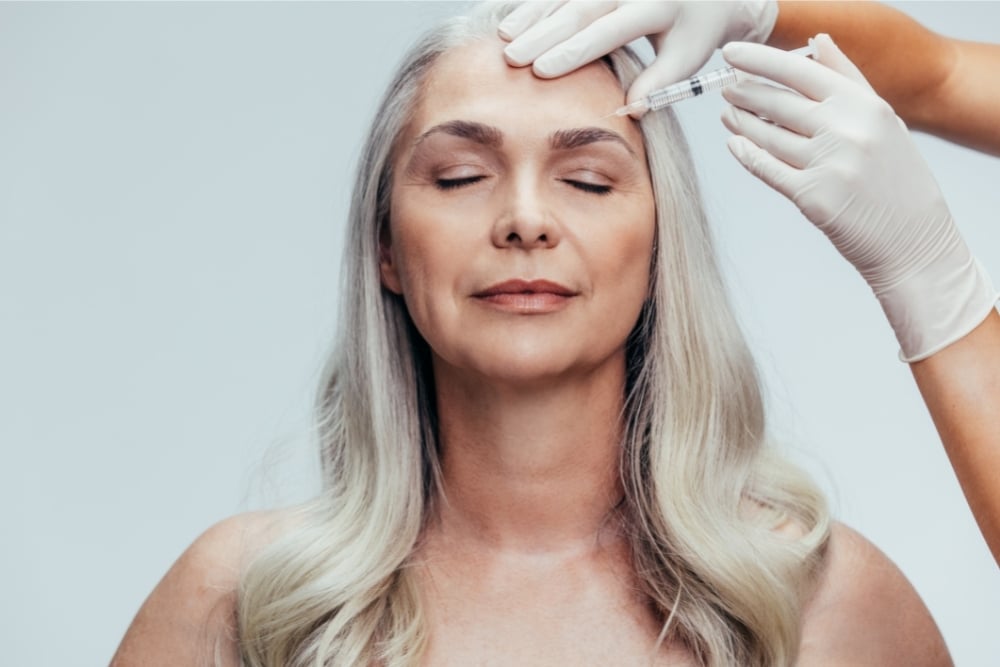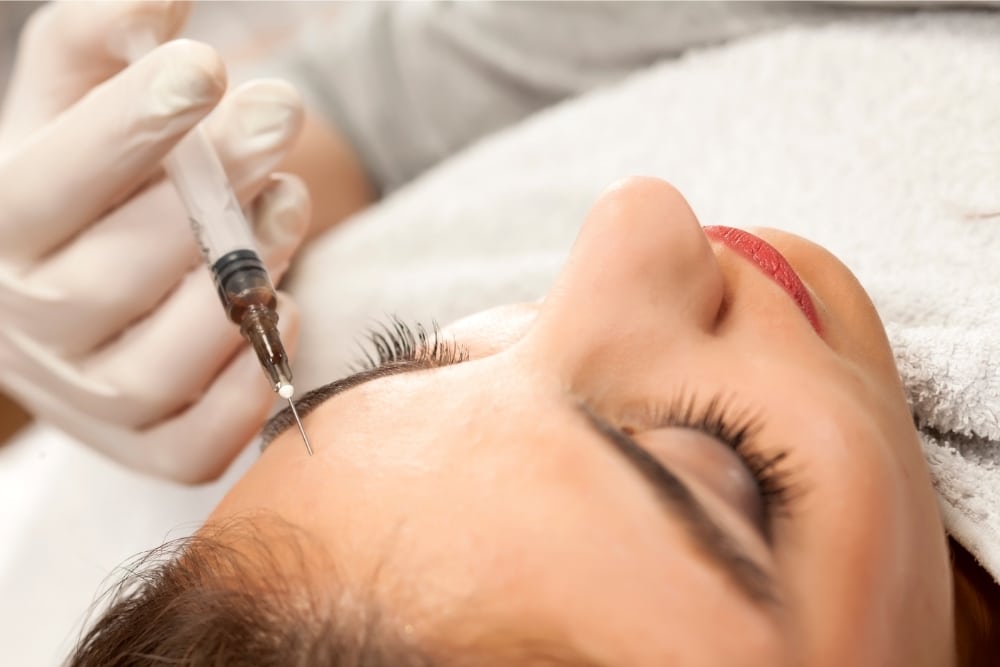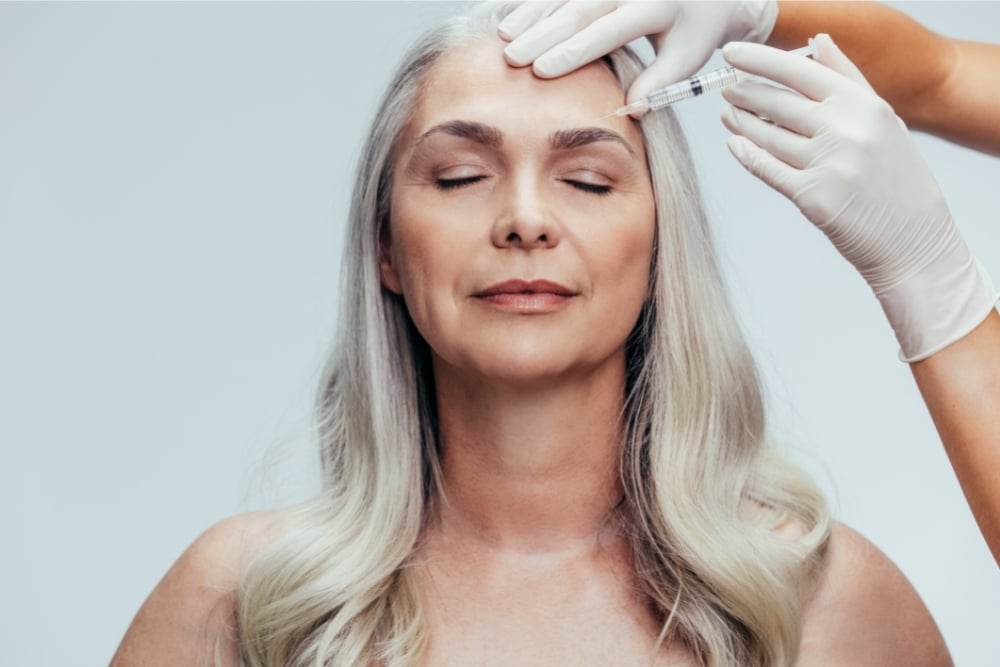When considering getting Botox, there are a few things you’ll need to bear in mind to ensure you get the best possible results from the procedure and reducing your recovery time if there is any swelling.
There are a handful of dos and don’ts when it comes to aftercare for Botox, some of which are more critical than others. One question that commonly gets asked is: how long after Botox can you lay down?
To make sure you get the best results from your procedure, all aestheticians will recommend their clients not to lie down for at least 4-6 hours after having their Botox done.
Lying down too soon after the Botox has settled and worked its magic, will increase the chance of it mitigating away to a different area of your face.
This could then reduce the effectiveness of your treatment, especially if you’ve only had your Botox in a small specific area of your face.

If I Lay Down After Having Botox, What Will Happen?
Lying down shouldn’t cause any long-term damage, however, there is a chance that the proteins in the Botox can migrate to different muscles in your face and cause complications.
If it’s completely slipped your mind and you’ve spent some time lying on the couch, then you shouldn’t need to be too worried as it shouldn’t have a long-term negative effect on you.
Since you’ve not allowed the Botox to completely settle, you may find that your results will not be as great as you were expecting. It is worth considering that you laid down, before making a complaint to your aesthetician.
Just always remember it’s not recommended to lie down for the first few hours after having Botox.
Can I Wear Makeup After Having Botox?
It’s recommended to not apply makeup to your face for at least 4 hours after having your Botox done, but then after this, you should be absolutely fine to do your usual makeup routine.
However, it’s recommended to be as gentle as possible when applying these products to your face, as rubbing the procedure area too hard can irritate it and could even cause the Botox to be mitigated.
Since you’ll need to be more gentle, it is recommended to use powder makeup products on your skin instead of liquid or cream products. These will require you to blend them into the skin with a more rough application.
You should try to wait at least 6 hours before applying any self-tanner or having a spray tan done, to reduce the risk of infection.
Remember, there’s no point in wearing makeup to your Botox appointment since the aesthetician will only remove it from the area you’re having the procedure.
How Should I Wash My Face After Botox?
There are no issues with washing your face straight after having Botox done, as long as you are gentle, use a mild cleanser and dry with a soft towel that won’t irritate the procedure area.
Try to use cold to tepid water and don’t use any cleansers that contain harsh ingredients that could irritate your skin and cause a possible infection.
Avoid using any of your usual facial scrubs, masks, or chemical peels on your face for around 2-3 days after having your Botox done. It is also recommended to not have any facial massages, microdermabrasion, facials, or laser treatments done following the first few days of having Botox.
Following the first couple of days of having Botox, you’ll need to take extra care when removing any makeup from your face, especially around the areas that you’ve had done.
If you’ve had Botox around the eye area, avoid using waterproof eye makeup as this will prove difficult to remove without heavy rubbing.
Try to avoid using makeup wipes, makeup remover on cotton pads, or any other materials that will cause you to rub your skin and possibly provoke the Botox area.
Use effective cleansing balms or creams that will break down the makeup without you having to rub at your skin continuously.

What Else Should I Avoid After Having Botox?
There are some other things that you should try to avoid after having your Botox treatment to make sure you get the most effective results.
Hot Showers: Ideally, you should not take a hot shower or bath within the first 6 hours of having your treatment. Showering or bathing is fine, it’s the hot temperatures that are the problem as it can increase the blood flow to your face and cause the Botox to be reduced.
Avoid using sunbeds for at least 7 days after having your Botox one.
Exercise: Avoid exercising for up to 24 hours after your Botox treatment as this can also increase your blood flow and therefore affect your Botox.
More low-impact exercises like yoga and pilates also count because, some of the positions that involve you facing upside down or lying flat can give you less effective results.
Doing too much exercise in the days following your Botox can increase the swelling and may even result in painful bruising. Try to take a week off from your usual exercise routine and stick to slow walks around your area.
Alcohol: It’s recommended to not drink alcohol for 24 hours after having Botox as it can enhance the drowsiness side effects that Botox can produce. Alcohol also thins your blood and will increase the chance of you developing bruising around your Botox site.
Anti-inflammatory Painkillers: If you’re worried about how painful the procedure will be, you can take paracetamol before and after the treatment to make sure that you won’t experience much pain. Some aestheticians may also apply some topical anesthetic on the area if you’re sensitive to pain.
However, clients should avoid using anti-inflammatory painkillers like ibuprofen or aspirin before and after their Botox. These medications thin the blood and can make the bruising worse.
Your aesthetician will ask you whether you’re currently taking any medication before carrying out the procedure so make sure to be honest, otherwise, you could experience some complications.
Going On A Plane: It’s recommended to not fly on an airplane for at least 48 hours after having Botox. The air pressure could cause the Botox to mitigate in your face.
What Potential Side Effects Come With Botox?
One of the most common side effects that come with most Botox treatments is mild swelling and bruising around the treated area. The area made appear red and tender, but it is only temporary and should gradually fade in 2-3 days.
Some people will experience slight pain during the procedure, but paracetamol will be able to reduce this.
For those who have Botox treatments around the eye area, you might experience dry or sensitive eyes for 1-2 days after having your Botox done.
Dizziness and lightheadedness is a side effect some people experience, especially if they are not comfortable around needles, or if they are nervous about the procedure.
How Long Does Botox Bruising Last?
How long bruising lasts can vary from client to client. Some patients may experience no bruising at all and some patients could have a bit of bruising for up to a week after the treatment.
- To reduce bruising and swelling, apply a cool compress to the treated area (ice wrapped in a towel) within the first few hours of having your procedure done.
- Try to keep your head elevated when sleeping to help the bruising go down quicker. This doesn’t mean sleeping completely upright, just prop two pillows under your head.
- Drink plenty of water, eat lots of fruits and vegetables and avoid salty and greasy foods as this will help the redness and swelling to go down.
- Make sure to only take paracetamol if the bruising is tender and is bothering you and avoid anti-inflammatory painkillers.

